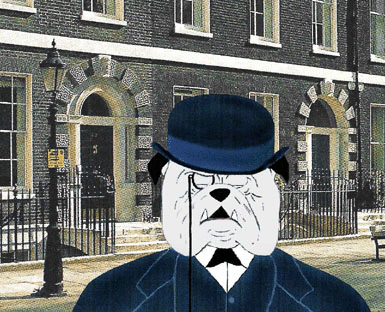Just found these animated bulldogs
Bulldogs World Forum Archives
These archives contain a copy of the contents of the old Bulldogs World Forum for reference purposes.Posting is disabled in the archives.
Click here to visit the active Bulldog Forum
Just found these animated bulldogs
Submitted by admin on April 20, 2010 - 9:26pm



and also links to doggles and pet portraits, etc. at this site:
http://www.maxhasthefacts.com/
More articles we recommend:


Now THAT is very cool...
And yet another site gets added to the favorites list...

The site has educational pieces with each one.
This is the first one:
Why Little Dogs Are Little
Researchers have finally solved one of the great canine mysteries: Why are small dogs small?
As it turns out, small dogs all bear a tiny piece of regulatory DNA that shuts off the gene that produces a powerful growth factor.
The gene regulator was probably inherited from a miniature wolf about 15,000 years ago, although it has since disappeared from the wolf population, and has spread rapidly throughout the dog world by human intervention.
"All dogs under 20 pounds have this – all of them," said biologist K. Gordon Lark of the University of Utah, one of the authors of the paper published today in the journal Science. "That's extraordinary."
The discovery helps explains the great diversity in size among dog breeds, the greatest diversity among any mammalian species. It also may have implications for humans.
"By learning how genes control body size in dogs, we are apt to learn something about how skeletal size is genetically programmed in humans," said geneticist Elaine A. Ostrander of the National Human Genome Research Institute, who led the study.
Researchers seeking to solve the riddle of why some dogs are little focused on a gene called IGF-1, the blueprint for a protein called insulin-like growth factor, which not only plays a role in human growth but also is implicated in cancer and certain skeletal diseases.
Learning how it is controlled will have many applications in humans, said Jeff Sossamon of the American Kennel Club's Canine Health Foundation, who was not involved in the research.
"The canine model is perfect for human research, because we share 85 percent of our genetic makeup with dogs," he said. "And we share 300 common diseases."
The study was triggered by biologist K. Gordon Lark of the University of Utah.
Lark speculated that small dogs arose because "a small wolf couldn't survive in nature, but it could survive in company with humans," or because an early human "wanted to domesticate a wolf and they didn't want to adopt a big sucker."
They spread rapidly because people liked them.
"Tiny dogs are not particularly functional," Kevin Chase colleague, biologist said.
"They don't hunt with you. They don't protect your house. They don't pull carts.
"They're just small and sweet."
Information source: From an article written by Thomas H. Maugh II. For the Los Angeles Times. Found in the Friday, April 6th. 2007 issue of The Arizona Republic newspaper.
Neat!
I wonder what they're all saying?

Thanks!
I'm fine! Just had company over the weekend, so we're now getting back to our regular schedules.
Too cute Anne.
Thanks for sharing. How are you doing?

Many things in this world may be subjective, but the beauty of a bulldog is an absolute.
How cute is that?
Thanks for sharing
Diana & Jade